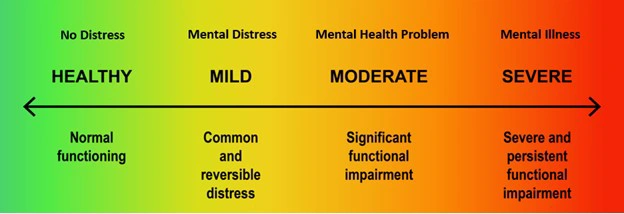Table of Contents
- Understanding the Mental Health Continuum Model and What it Means for NDIS Funding
- How does the NDIS view mental health, mental ill health, and recovery?
- How does the mental health continuum model link to the NDIS and funding eligibility?
- What counts as a significant impairment?
- Conclusion
- Still confused?
Understanding the Mental Health Continuum Model and What it Means for NDIS Funding
Did you know that 10% of those who receive NDIS funding have a psychosocial disability? This means that if you have a mental health condition that causes a psychosocial disability, you may be eligible for NDIS funding too.
Many people who may qualify for NDIS funding on the basis of a psychosocial disability face a huge problem — they don’t know how to determine whether they’re eligible or not. With so much information and jargon to sieve through, understanding the eligibility requirements can feel overwhelming. That’s why we’ve put together this article — to help make the NDIS eligibility criteria clearer for you!
How does the NDIS view mental health, mental ill health, and recovery?
Before diving into the NDIS eligibility requirements for those experiencing mental health problems, it can help to understand how the NDIS views mental health, mental ill health, and recovery. The NDIS views these concepts within the context of a broader framework called the mental health continuum model.
The mental health continuum model recognises the following as truths regarding mental health, mental ill health, and recovery:
Mental health and mental ill health mean more than just being healthy or unhealthy.
They exist on a spectrum, which anyone can move along in either direction at different points in their lives.
At the extreme positive end of the spectrum, optimal mental wellbeing can be attained, characterised by positive emotions, effective stress management, and a sense of purpose. But as a person moves towards the other end, their mental health can deteriorate, ranging from mild to more severe psychological distress and functional impairment.
The direction a person moves in at any moment can depend on various factors, like their life circumstances, coping strategies, and the support available to them.
Mental health and mental ill health is not static
It’s normal for people to move backwards and forwards on the continuum at different points in their life, experiencing periods of improved mental wellbeing or increased psychological distress.
Living with a mental health condition does not impact everyone in the same way
There are many factors that can influence how a person’s experience unfolds. Two people can have the same condition, but differences in its severity can lead to different levels of functional impairment.
Recovery does not always mean the absence of symptoms
Rather, it’s about learning to cope and manage symptoms in the best way possible. It’s also about working towards creating a fulfilling life in spite of mental health challenges and conditions. This can be attained through things like pursuing personal goals and interests, building meaningful relationships, and getting the right support.

How does the mental health continuum model link to the NDIS and funding eligibility?
The NDIS views mental health, mental ill health, and recovery in much the same way as laid out by the health continuum model. It acknowledges that recovery is personal and that some people may be more significantly impacted by mental health challenges than others. As such, when defining their eligibility criteria, the NDIS supports those who are most severely impacted by their mental health conditions.
How does the NDIS identify those most severely impacted?
The NDIS establishes two main criteria for determining who is most severely affected. To qualify for NDIS funding, a psychosocial disability caused by your mental health condition should:
- Significantly interfere with your ability to do everyday activities on your own
- Be permanent, even if it improves or gets worse over time.
Basically, the NDIS checks how hard it is for you to manage your everyday life on your own, and if these difficulties are likely to last throughout your life.
When assessing how difficult it is for you to do everyday activities, the NDIS looks at what they call your ‘functional capacity’ in six different areas of your life. The six core life areas that the NDIS looks at include:
- Mobility. This is your ability to do things in and outside the home. It can include your ability to feed and dress yourself, use public transport, do your shopping, and other tasks that require you to be mobile.
- Communication. This involves your ability to express yourself and understand others. It includes your speaking, listening, reading, and writing skills.
- Social interaction. This relates to how you engage with others, and whether you’re able to make friends and participate in social activities.
- Learning. This relates to your ability to acquire new skills, understand information, and apply knowledge in different situations.
- Self-management. This is about being able to take care of yourself, your health, and your daily responsibilities.
- Self-care. This focuses on your capacity to perform personal care tasks like bathing, dressing, eating, and maintaining personal hygiene.
If you struggle to complete everyday tasks in at least one of these areas, then you may qualify for NDIS funding. But your impairment has to be significant.
What counts as a significant impairment?
The NDIS sets a distinction between what they call ‘reduced’ and ‘significantly reduced’ functional capacity to help determine the level of impact a psychosocial disability has on your daily life.
Reduced functional capacity means that your mental health condition may make some aspects of daily life difficult, but these can be managed with minor adjustments.
For example, going shopping alone might make you anxious, but if you go during quieter times of the day, you may cope just fine. This level of impairment would be considered mild to moderate. It means you’d probably fall somewhere in the middle on the mental health continuum, where you experience some psychological distress but only minor functional impairment. At this level, you wouldn’t qualify for NDIS funding because the impact on your daily life isn’t significantly severe.
On the other hand, significantly reduced functional capacity means that the daily challenges you face are more severe and can’t be fixed with minor changes. For example, your anxiety may be so severe that it prevents you from leaving home altogether. When certain activities are impossible for you to do because of a psychosocial disability, the NDIS considers your functional capacity to be significantly reduced and you may qualify for funding.
Conclusion
Understanding mental health, mental ill health, and recovery according to the mental health continuum model can help you understand the NDIS eligibility requirements better.
Remember, according to the mental health continuum model:
- Mental health exists on a spectrum, with optimal mental health on one end and mental illness on the other end
- Everyone can and does move along the spectrum at different points in their lives depending on a range of factors, like their life circumstances, coping strategies, and access to support
- Recovery is personal and can mean different things to different people
- Not everyone is impacted to the same extent by mental health challenges and conditions. Some people are more severely affected.
Based on this understanding of mental health, mental ill health, and recovery, the NDIS supports those who are most severely impacted on a functional level by their mental health conditions.
Still confused?
Don’t worry, it’s normal to feel overwhelmed! Navigating the NDIS can be complicated. But you don’t have to do it alone. There are people who know how the system works, and they can help you with your application. Our coaches are available to discuss your case and help you out in your recovery journey. The great news is that everything can be done online, making the process convenient and comfortable for you!
At Goal Coach, we’re experts in mental health and the NDIS so you can always give us a call and we can give you some tips and point you in the right direction. Book a free 15-minute chat to ask us all your questions and find out more about what we do…
Don’t forget, you can access recovery coaching with Goal Coach whether you have an NDIS plan or not.










